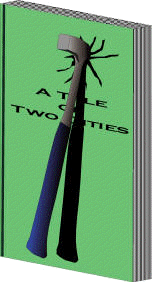Geology Through Literature: Reaper Man
Recently I have been working my way through Terry Pratchett's Discworld series and I stumbled upon this reference to Evolution that I thought was perfect and I wanted to highlight here. The Discworld series is about a planet, which is in the shape of a disk, riding on four elephants, all standing on the back of a giant turtle, riding around through the cosmos. So it is a magical land in which anything can happen, and it often does. While reading the books I have found that Terry often has a satirical look at the world and his humor is not always for everyone but I find it fantastic.
Here is a humorous look at evolution from his perspective:
Whereas the oldest things on the Discworld were the famous Counting Pines, which grow right on the permanent snowline of the high Ramtop Mountains.
The Counting Pine is one of the few known examples of borrowed evolution. Most species do their own evolving, making it up as they go along, which is the way Nature intended. And this is all very natural and organic and in tune with mysterious cycles of the cosmos, which believes that there's nothing like millions of years of really frustrating trial and error to give a species moral fibre and, in some cases, backbone. This is probably fine from the species' point of view, but from the perspective of the actual individuals involved it can be a real pig, or at least a small pink root-eating reptile that might one day evolve into a real pig.
So the Counting Pines avoided all this by letting other vegetables do their evolving for them. A pine seed, coming to rest anywhere on the Disc, immediately picks up the most effective local genetic code via morphic resonance and grows into whatever best suits the soil and climate, usually doing much better at it than the native trees themselves, which it usually usurps.
What makes the Counting Pines particularly noteworthy, however, is the way they count. Being dimly aware that human beings had learned to tell the age of a tree by counting the rings, the original Counting Pines decided that this was why humans cut trees down. Overnight every Counting Pine readjusted its genetic code to produce, at about eye-level on its trunk, in pale letters, its precise age. Within a year they were felled almost into extinction by the ornamental house number plate industry, and only a very few survive in hard-to-reach areas.
The six Counting Pines in this clump were listening to the oldest, whose gnarled trunk declared it to be thirty-one thousand, seven hundred and thirty-four years old. The conversation took seventeen years, but has been speeded up.
'I remember when all this wasn't fields.' The pines stared out over a thousand miles of landscape. The sky flickered like a bad special effect from a time travel movie. Snow appeared, stayed for an instant, and melted.
'What was it, then?' said the nearest pine.
'Ice. If you can call it ice. We had proper glaciers in those days. Not like the ice you get now, here one season and gone the next. It hung around for ages.'
'What happened to it, then?'
'It went.'
'Went where?'
'Where things go. Everything's always rushing off.'
'Wow. That was a sharp one.'
'What was?'
'That winter just then.'
'Call that a winter? When I was a sapling we had winters -'
Then the tree vanished.
After a shocked pause for a couple of years, one of the clump said: 'He just went! Just like that! One day he was here, next he was gone!'
If the other trees had been humans, they would have shuffled their feet.
'It happens, lad,' said one of them, carefully.
'He's been taken to a Better Place, you can be sure of that. He was a good tree.'
The young tree, which was a mere five thousand, one hundred and eleven years old, said: 'What sort of Better Place?'
'We're not sure, ' said one of the clump. It trembled uneasily in a weeklong gale. 'But we think it involves . . . sawdust.'
Since the trees were unable even to sense any event that took place in less than a day, they never heard the sound of axes.

